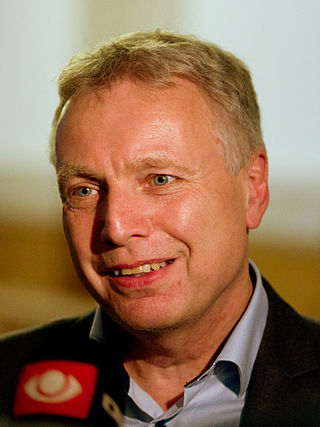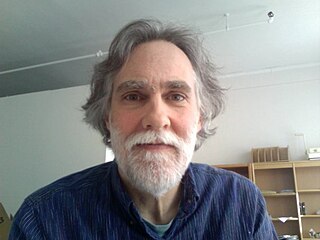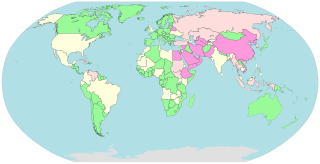An Internet filter is software that restricts or controls the content an Internet user is capable to access, especially when utilized to restrict material delivered over the Internet via the Web, Email, or other means. Content-control software determines what content will be available or be blocked.
Computer and network surveillance is the monitoring of computer activity and data stored locally on a computer or data being transferred over computer networks such as the Internet. This monitoring is often carried out covertly and may be completed by governments, corporations, criminal organizations, or individuals. It may or may not be legal and may or may not require authorization from a court or other independent government agencies. Computer and network surveillance programs are widespread today and almost all Internet traffic can be monitored.
An open standard is a standard that is openly accessible and usable by anyone. It is also a prerequisite to use open license, non-discrimination and extensibility. Typically, anybody can participate in the development. There is no single definition, and interpretations vary with usage.
Various anti-spam techniques are used to prevent email spam.

The Proposal for a Directive of the European Parliament and of the Council on the patentability of computer-implemented inventions, procedure number 2002/0047 (COD) was a proposal for a European Union (EU) directive aiming to harmonise national patent laws and practices concerning the granting of patents for computer-implemented inventions, provided they meet certain criteria. The European Patent Office describes a computer-implemented invention (CII) as "one which involves the use of a computer, computer network or other programmable apparatus, where one or more features are realised wholly or partly by means of a computer program".
The term Listserv has been used to refer to electronic mailing list software applications in general, but is more properly applied to a few early instances of such software, which allows a sender to send one email to a list, which then transparently sends it on to the addresses of the subscribers to the list.

Naive Bayes classifiers are a popular statistical technique of e-mail filtering. They typically use bag-of-words features to identify email spam, an approach commonly used in text classification.
The Australian Communications and Media Authority (ACMA) is an Australian government statutory authority within the Communications portfolio. ACMA was formed on 1 July 2005 with the merger of the Australian Broadcasting Authority and the Australian Communications Authority.
The Red–Green Alliance or Unity List is an eco-socialist political party in Denmark. It was founded in 1989 with the merger of three Marxist parties and it is the furthest left-wing party in the Danish parliament, where it advocates for an expansion of welfare and social justice as well as socialist transformation in Denmark and internationally. During the 2021 Danish municipal elections the party placed first in the Danish capital Copenhagen, with 24.6% of the votes. The party is also active in various Danish trade unions.
Internet censorship in Tunisia significantly decreased in January 2011, following the ouster of President Zine El Abidine Ben Ali, as the new acting government removed filters on social networking sites such as YouTube.

The Open Rights Group (ORG) is a UK-based organisation that works to preserve digital rights and freedoms by campaigning on digital rights issues and by fostering a community of grassroots activists. It campaigns on numerous issues including mass surveillance, internet filtering and censorship, and intellectual property rights.
Bennett Haselton is the founder of Circumventor.com and Peacefire.org, two US-based websites dedicated to combating Internet censorship. Peacefire.org is focused on documenting flaws in commercial Internet blocking programs. Circumventor.com is dedicated to distributing anti-censorship tools to users in countries such as China and Iran, and as of 2011 has over 3 million subscribers through distribution channels including email and Facebook pages.

European Digital Rights (EDRi) is an international advocacy group headquartered in Brussels, Belgium. EDRi is a network collective of non-profit organizations (NGO), experts, advocates and academics working to defend and advance digital rights across the continent. As of October 2022, EDRi is made of more than 40 NGOs, as well as experts, advocates and academics from all across Europe.

Internet censorship is the legal control or suppression of what can be accessed, published, or viewed on the Internet. Censorship is most often applied to specific internet domains but exceptionally may extend to all Internet resources located outside the jurisdiction of the censoring state. Internet censorship may also put restrictions on what information can be made internet accessible. Organizations providing internet access – such as schools and libraries – may choose to preclude access to material that they consider undesirable, offensive, age-inappropriate or even illegal, and regard this as ethical behaviour rather than censorship. Individuals and organizations may engage in self-censorship of material they publish, for moral, religious, or business reasons, to conform to societal norms, political views, due to intimidation, or out of fear of legal or other consequences.
Censorship in Denmark has been prohibited since 1849 by the Constitution:
§ 77: Any person shall be at liberty to publish his ideas in print, in writing, and in speech, subject to his being held responsible in a court of law. Censorship and other preventive measures shall never again be introduced.

The public domain (PD) consists of all the creative work to which no exclusive intellectual property rights apply. Those rights may have expired, been forfeited, expressly waived, or may be inapplicable. Because no one holds the exclusive rights, anyone can legally use or reference those works without permission.
Multi view Video Coding is a stereoscopic video coding standard for video compression that allows for the efficient encoding of video sequences captured simultaneously from multiple camera angles in a single video stream. It uses the 2D plus Delta method and is an amendment to the H.264 video compression standard, developed jointly by MPEG and VCEG, with contributions from a number of companies, primarily Panasonic and LG Electronics.

Uffe Elbæk is a Danish politician, social worker, author, journalist, entrepreneur. In 2013 he founded the green political party The Alternative, which he led until February 2020. He is an independent member of the Folketing.

Gary Robinson is an American software engineer and mathematician and inventor notable for his mathematical algorithms to fight spam. In addition, he patented a method to use web browser cookies to track consumers across different web sites, allowing marketers to better match advertisements with consumers. The patent was bought by DoubleClick, and then DoubleClick was bought by Google. He is credited as being one of the first to use automated collaborative filtering technologies to turn word-of-mouth recommendations into useful data.

This list of Internet censorship and surveillance in Europe provides information on the types and levels of Internet censorship and surveillance that is occurring in countries in Europe.










